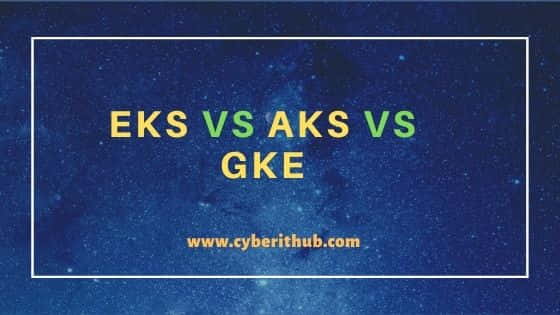Table of Contents
In this article, we will see the best comparison between EKS, AKS and GKE Managed Kubernetes Services. If you are not aware then to give you a quick background, all of the major cloud service providers has its own managed service for Kubernetes, commonly known as Elastic Kubernetes Service in Amazon Cloud, Azure Kubernetes Service in Microsoft Azure Cloud and Google Kubernetes Engine in Google Cloud. Any users who do not want to go through the pain of creating instance and then installing Kubernetes manually on top of it, can directly use this Kubernetes as a Service solution.
Now when you have decided that you need to use the Kubernetes as a service, then the next logical question is which Kubernetes Service Provider should you choose ? Well, to answer this question, you need to compare the services provided by them and choose as per your requirement. Here we will see all the important points that will help you choose the right solution provider.

EKS vs AKS vs GKE
Also Read: 5 Practical Steps to Create and Use ReplicaSet in Kubernetes with Examples
1. EKS(Elastic Kubernetes Service)
- EKS is also known as Elastic Kubernetes Service. It is managed Kubernetes service provided by the Amazon Cloud.
- It was first released in June 2018.
- EKS is one of the most used Kubernetes Service. More on EKS docs.
- Version: Kubernetes version 1.20 is now available in Amazon EKS.
- RBAC Support: Role-based access control implementations are fully supported.
- Cluster Upgrade: EKS has the most manual steps to upgrade the Kubernetes components.
- Node health Repair: It does not provide automatic node health repair feature.
- SLA: EKS provides 99.95% Service Level Agreement.
- Monitoring: It recommends use of third party tool like Prometheus for Kubernetes Resource Monitoring.
- Nodes: A total of 1000 nodes supported in a given EKS Cluster.
- Pricing: Amazon EKS price is $0.10 per hour for each cluster deployment.
- Government Cloud Support: EKS is not available in AWS Government Cloud.
- Container Runtime: Docker is the default container runtime.
- Load Balancer: Amazon EKS supports both Network Load Balancer as well as Classic Load Balancer.
- App Secrets Encryption: It supports App Secrets Encryption through AWS KMS.
- CLI Support: EKS has complete CLI Support along with the support of eksctl tool.
- Network Policy: Calico network policy is available and supported.
- KNative Support: It does not have KNative Support.
- Service Mesh: It uses App Service Mesh.
- Containers: Supports both Linux and Windows Containers.
- GPU Nodes: It fully supports GPU nodes.
- Bare Metal Nodes: EKS allows bare metal nodes.
2. AKS(Azure Kubernetes Service)
- AKS is also known as Azure Kubernetes Service. It is a managed Kubernetes service provided by the Microsoft Azure Cloud.
- It was also first released in June 2018.
- After Amazon EKS, AKS is the next most popularly used Kubernetes Service. More on AKS docs.
- Version: Kubernetes version 1.20 is the default version available in AKS.
- RBAC: Role-based access control implementations are fully supported.
- Upgrade: AKS has less manual steps than EKS to upgrade the Kubernetes components.
- Node Health Repair: It provides automatic node health repair.
- SLA: AKS provides 99.95% Service Level Agreement.
- Monitoring: It has native Kubernetes resource monitoring tool called Azure Monitor.
- Nodes: As of now, a default of 100 nodes per AKS Cluster is supported but you can raise a request and increase this value in case you need it.
- Pricing: Microsoft AKS price is $0.192 per hour for each cluster deployment.
- Government Cloud: AKS is available in atleast one Azure Government Cloud.
- Container Runtime: Docker is the default container runtime.
- Load Balancer: AKS only supports basic or standard load balancer.
- App Secrets Encryption: It does not support App Secrets Encryption.
- CLI Support: AKS has complete CLI Support.
- Network Policy: Both Azure Network Policies and Calico Network Policies are available.
- KNative Support: It has KNative Support.
- Service Mesh: It uses OSM(Open Service Mesh).
- Containers: Supports both Linux and Windows Containers.
- GPU Nodes: It fully supports GPU Nodes.
- Bare Metal Nodes: AKS only use virtual machines.
3. GKE(Google Kubernetes Engine)
- GKE is also known as Google Kubernetes Engine. It is a managed Kubernetes service provided by the Google Cloud.
- It was first released in August 2015 for general use.
- Since Kubernetes was created by the Google, it is undoubtedly the most refined service. More on GKE docs.
- Version: Kubernetes version 1.19 is the default one in GKE.
- RBAC: Role-based access control implementations are fully supported
- Upgrade: GKE has automatic process to upgrade the Kubernetes components.
- Node Health Repair: It provides automatic node health repair.
- SLA: GKE will provide 99.95% SLA only if you use Regional Clusters otherwise it is 99.50% SLA in case of clusters based on zones.
- Monitoring: It has native Kubernetes resource monitoring tool called Stackdriver.
- Nodes: By default, it allows 5000 nodes per GKE Cluster but you can increase this value by raising a request.
- Pricing: GKE charges $0.10 per hour for each cluster deployment.
- Government Cloud: It does not have Government Cloud Support as Google Cloud has no government cloud.
- Container Runtime: Docker is the default container runtime.
- Load Balancer: GKE supports Container-native load balancer.
- App Secrets Encryption: It supports Cloud Secret Encryption through Cloud KMS.
- CLI Support: GKE has complete CLI Support.
- Network Policy: GKE implements network policy using Calico.
- KNative Support: It has KNative Support.
- Service Mesh: It uses Istio Service Mesh.
- Containers: Supports both Linux and Windows Containers.
- GPU Nodes: It fully supports GPU Nodes.
- Bare Metal Nodes: GKE only use virtual machines.
